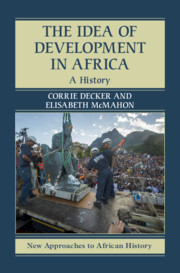Book contents
- The Idea of Development in Africa
- New Approaches to African History
- The Idea of Development in Africa
- Copyright page
- Contents
- Figures
- Tables
- Maps
- Boxes
- Acknowledgments
- Maps
- Introduction
- Part I Origins of the Development Episteme
- Chapter 1 From Progress to Development
- Chapter 2 Knowledge and the Development Episteme
- Chapter 3 Eugenics and Racism in the Development Episteme
- Chapter 4 Decolonizing the Idea of Development
- Part II Implementation of the Development Episteme
- Part III “Problems” in the Development Episteme
- Epilogue
- Bibliography
- Index
- References
Chapter 4 - Decolonizing the Idea of Development
from Part I - Origins of the Development Episteme
Published online by Cambridge University Press: 16 October 2020
- The Idea of Development in Africa
- New Approaches to African History
- The Idea of Development in Africa
- Copyright page
- Contents
- Figures
- Tables
- Maps
- Boxes
- Acknowledgments
- Maps
- Introduction
- Part I Origins of the Development Episteme
- Chapter 1 From Progress to Development
- Chapter 2 Knowledge and the Development Episteme
- Chapter 3 Eugenics and Racism in the Development Episteme
- Chapter 4 Decolonizing the Idea of Development
- Part II Implementation of the Development Episteme
- Part III “Problems” in the Development Episteme
- Epilogue
- Bibliography
- Index
- References
Summary
This chapter outlines the connections between African resistance to cultural imperialism during the colonial era, the call to “decolonize the mind” in the 1970s and 1980s, and, finally, debates about decolonizing development today. All of these movements have challenged the racial and cultural inequalities built into the development episteme. Decolonizing development entails much more than pointing out the legacies of the civilizing mission or colonialism in contemporary development discourses on Africa. Both Western and African cultures transformed over time, but what has not changed is the perception that the former is “modern” and the latter “traditional.” The false dichotomy between the “developed” West (or “the global north”) and the “less developed” or “developing” countries of Africa (as part of “the global south”) reifies colonial-era stereotypes and continues to fuel the development industry. Whether seeking to transform a “backward” custom or making decisions about expenditure, hierarchies of power are foundational to the development episteme. As long as Africans remain the targets of intervention rather than the policy makers or drivers of development, and as long as development remains an industry whose power base remains in the global north, efforts to decolonize development will fail to restructure the development episteme.
- Type
- Chapter
- Information
- The Idea of Development in AfricaA History, pp. 79 - 100Publisher: Cambridge University PressPrint publication year: 2020

